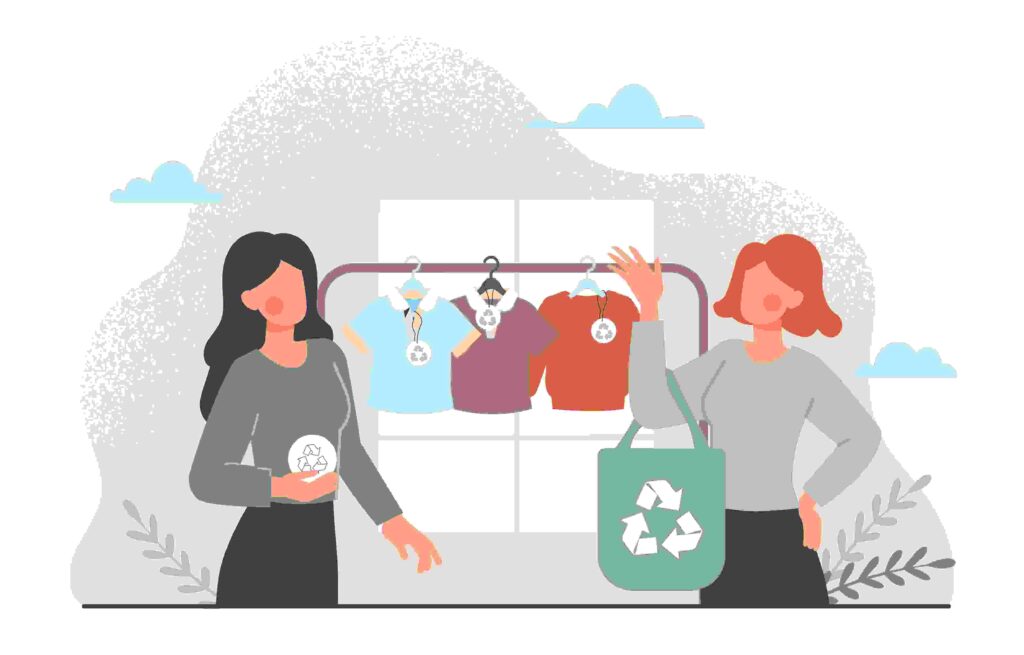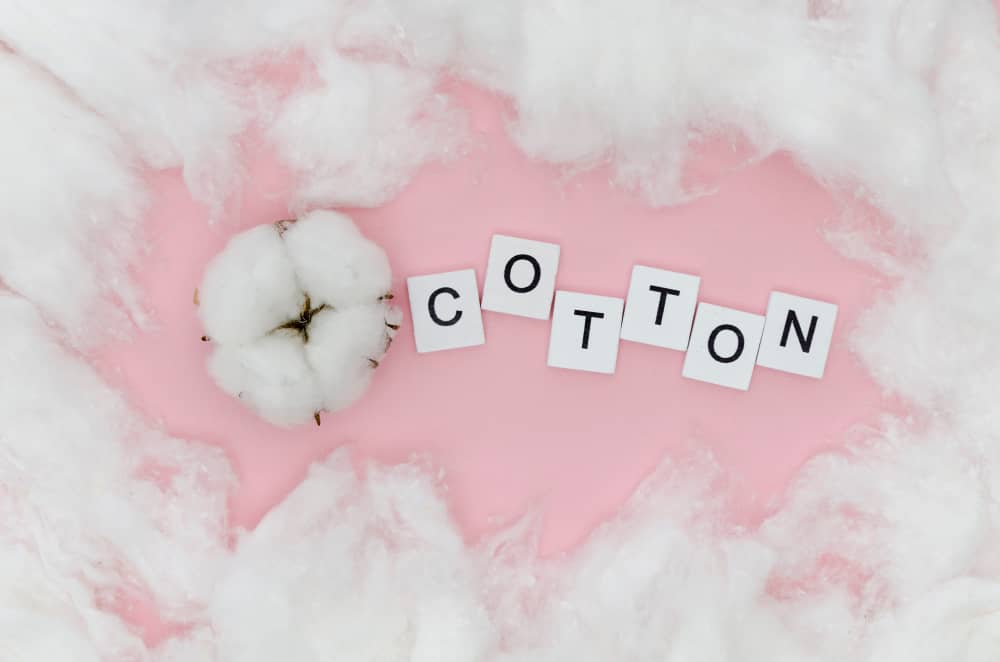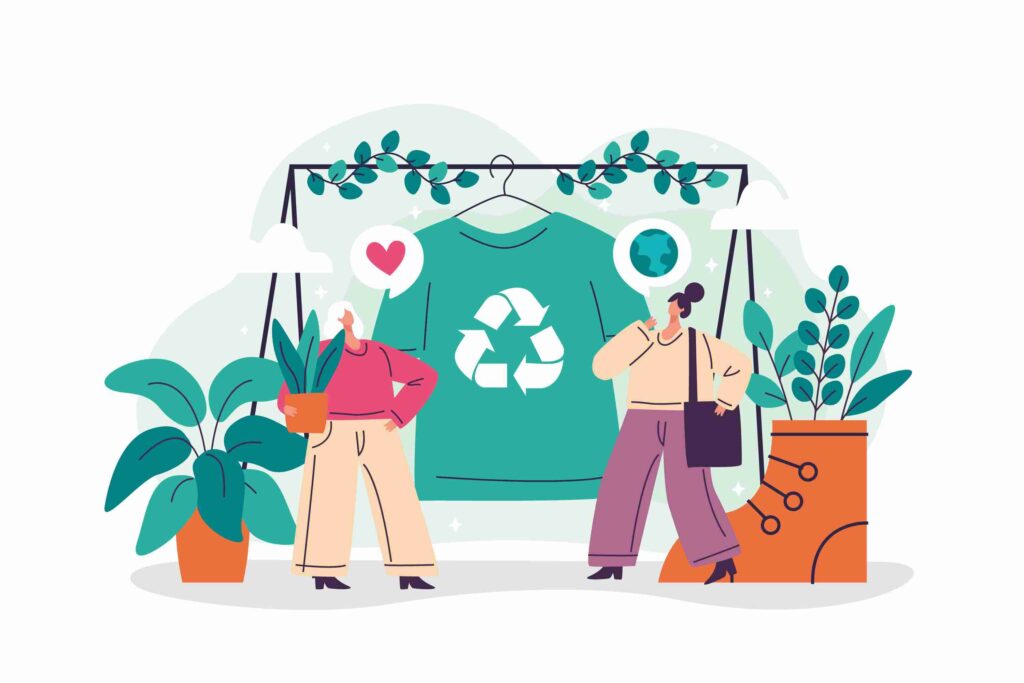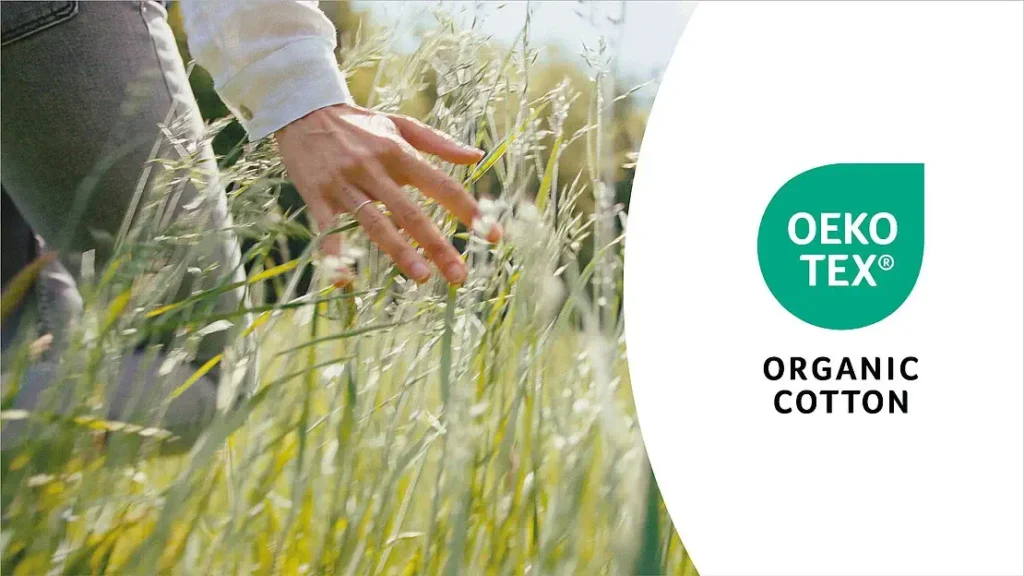As global consumers become increasingly conscious of environmental protection and sustainability, organic cotton T-shirts are emerging as the top choice for fashion brands and the Print on Demand (POD) community. Beyond offering comfort and skin-friendly softness, this product line helps sellers establish a green brand identity, enhance product value, and achieve sustainable profit growth in 2025.
This article will help you understand what organic cotton T-shirts are, why the “green movement” is dominating the fashion and Print on Demand industries, and which top-quality blank brands sellers should choose to stay ahead in the global sustainability wave.

What Are Organic Cotton T-Shirts and Why Are They Popular in the POD Industry?
Before diving into profitability, it’s important to understand: what does “organic cotton” actually mean? And why is it completely different from the conventional cotton we’re all familiar with?
What Is Organic Cotton?

Organic cotton is a type of cotton grown without the use of synthetic chemicals, pesticides, or genetically modified seeds (GMO – Genetically Modified Organisms). Instead, farmers rely on natural fertilizers, crop rotation, and sustainable water management practices to protect the soil, the environment, and human health. The production process of organic cotton is strictly monitored by international organizations such as GOTS (Global Organic Textile Standard), ensuring that the product is not only “green” but also “clean” at every stage.
How Is Organic Cotton Different from Regular Cotton?
In the Print on Demand (POD) industry where each product is made to order and represents the seller’s brand the quality of the blank shirt plays a crucial role. Organic cotton offers:
- A smoother fabric surface, making DTG (Direct to Garment) and DTF (Direct to Film) prints sharper and more vibrant.
- A premium wearing experience buyers can instantly feel the difference upon touch.
- Stronger brand value when you promote “Eco-friendly & Made with Organic Cotton,” customers perceive your shop as responsible and professional.
For customers, the difference might simply be “a softer feel.” But for the planet and for your brand story the difference is monumental.
| Criteria | Regular Cotton | Organic Cotton |
| Farming Method | Uses chemicals and pesticides | No chemicals, natural farming |
| Environmental Impact | Pollutes soil & water | Reduces 90% of water use & 60% of carbon emissions |
| Softness & Breathability | Fairly good | Softer, more breathable, skin-friendly |
| Durability & Print Quality | Fades after a few washes | Retains color and shape longer |
| Price | Lower | Higher by ~15–25% |
With its superior quality and environmental friendliness, organic cotton T-shirts are not only favored by consumers but also serve as a powerful branding tool that helps POD sellers position themselves in the premium market segment.
Why Should POD Sellers Care? “Is the Print Quality Good Enough?
This is the most important question every POD seller asks: How good is the print quality?
The good news is: DTG (Direct-to-Garment) print quality on organic cotton T-shirts is not only good it’s exceptional.
Most high-end organic cotton blanks are made from ringspun cotton, which goes through an extra refining process that produces longer, smoother, and tighter fibers. The result is an ultra-flat surface perfect for DTG ink adhesion.
- Smooth surface: Allows ink to absorb evenly, preventing blotches or inconsistencies.
- Vivid colors: Prints appear more vibrant, detailed, and true-to-color compared to coarse or loosely woven fabrics.
- Print durability: Stronger fibers (untreated by harsh chemicals) retain color longer after washing, reducing cracking or fading.
The “Green Movement” in Fashion and POD
Sustainable Fashion – From a Niche Trend to a Market Standard
Just a few years ago, “sustainable fashion” was considered a niche concept – a trend reserved for a small group of environmentally conscious consumers. But by 2025, it has evolved into a market standard that every brand must strive to achieve.
Industry giants like Nike and Adidas now regularly publish transparent supply chain reports and launch collections made from recycled materials. Within the Print on Demand (POD) sector, providers are rapidly expanding their organic blank apparel lines, adopting eco-friendly inks, and optimizing logistics to reduce carbon emissions.
This global transformation is being driven by three key factors:
- Policies and Regulations: Major markets like the United States and especially the European Union (EU) are tightening environmental regulations, requiring brands to disclose supply chain transparency and take action against “greenwashing.”
- Consumer Pressure: Generation Z, the dominant buying force in the POD industry, is leading this change. They actively seek and are willing to pay more for products with eco-friendly certifications, GOTS (Global Organic Textile Standard), or Fair Trade approval.
- Printing Technology Breakthroughs: Modern technologies such as DTG (Direct to Garment) and DTF (Direct to Film) printing use water-based inks that are non-toxic and safe for both wearers and the environment. These processes minimize ink and water waste, aligning perfectly with the “zero waste” manufacturing model.
POD – The Perfect Intersection of Creativity and Sustainability
By nature, the Print on Demand model already carries a more sustainable DNA compared to traditional fast fashion.
- Zero-Waste Production: The biggest advantage of POD is that it produces only what is ordered, no overproduction, no unsold inventory. Every item is made on demand.
- Reduced Textile Waste: The model eliminates the massive waste problem caused by unsold or outdated seasonal collections typical in traditional fashion.
- Optimized Shipping: Global fulfillment networks (such as FlashShip’s partner network) allow orders to be produced and shipped from the facility closest to the end customer, significantly reducing CO₂ emissions from long-distance transport.
When you combine this on-demand manufacturing advantage with sustainable materials like organic cotton T-shirts, you get the perfect product: unique in design, ethical in value, and powerful in brand storytelling. POD sellers can now confidently deliver products that are not only creative but also carry a sustainable mission, resonating deeply with the modern consumer mindset.
The U.S. Market: A “Fertile Ground” for Sustainable POD Products
Nowhere else in the world are ethical values more appreciated and more willingly paid for than in the United States.
The numbers speak for themselves. According to Statista (2025), the size of the sustainable fashion market in the U.S. has surged to $12.4 billion, marking an astonishing growth of over 80% compared to 2020.
Even more important for POD sellers, an analysis across major e-commerce platforms such as Etsy, Amazon Handmade, and Shopify reveals that products labeled “organic,” “eco-friendly,” or “sustainable cotton” achieve a 27% higher conversion rate on average.
In other words, American consumers don’t just say they prefer sustainable products they’re actively searching for them and are more likely to click “Buy Now” when they see those eco labels.
The “Green Friday” movement replacing the traditional “Black Friday” with mindful, responsible shopping is also gaining momentum across the U.S. market. For POD sellers, this presents an extraordinary opportunity to strengthen brand positioning. Instead of competing solely on price, compete on value. And in this new era of conscious commerce, organic cotton T-shirts are your most powerful weapon in that race.
Key Advantages of Organic Cotton T-Shirts in the POD Model

Switching to organic cotton T-shirts isn’t an expense it’s an investment. While the base cost may be slightly higher, the ROI (Return on Investment) is far superior. Here’s what you actually gain:
Unlocking the Premium Customer Segment
Step out of the crowded “$19.99 T-shirt trap.” When you sell organic cotton apparel, you’re targeting a completely different customer group:
- They have higher income levels.
- They shop with intention, not impulse.
- They value quality and ethical standards.
Niches such as Yoga & Meditation, Eco-living, Vegan Lifestyle, Sustainable Travel, Minimalism, and Mother & Baby (sensitive-skin safe) are fertile ground for this product category. These audiences actively search for keywords like “eco-friendly T-shirt” or “organic cotton yoga shirt” and are willing to pay a premium price for products that align with their values.
Higher Profit Margins
Don’t let the higher base cost scare you it’s a matter of value, not just cost.
Example (Simulation):
- Regular Cotton T-Shirt: Base cost $12 → Sell at $22 → Profit: $10 (Highly competitive, ad-dependent).
- Organic Cotton T-Shirt: Base cost $17 (just $5 more) → Sell at $35–$40 → Profit: $18–$23.
Not only are you earning more per sale, but you’re also building long-term brand equity that allows you to maintain premium pricing over time.
Your customers aren’t buying just a shirt, they’re buying into your brand’s story, values, and promise of quality. That’s why they won’t compare your product to a mass-printed T-shirt on Amazon.
In short, organic cotton apparel doesn’t just increase profits, it transforms your business from a commodity shop into a trusted, value-driven brand.
Building a Sustainable Brand
This is the greatest benefit of all. Designs can be copied but your brand story is one of a kind.
When you use GOTS-certified blanks, you gain an entire library of meaningful marketing content:
- About Us Page: “We don’t just sell T-shirts; we’re committed to a greener planet…”
- Product Description: “Experience the difference of 100% GOTS-certified organic cotton grown without a single drop of harmful pesticide. Gentle on your skin, kind to the Earth.”
- Social Media: Tell stories about GOTS certification, water conservation, and the reasons behind your sustainability journey.
This level of transparency builds trust, and trust leads to loyalty. Customers will not only come back to buy from you, but they’ll also proudly share your brand with others becoming your very own brand ambassadors.
Superior Print Quality
A common misconception is that “all DTG prints look the same, regardless of fabric.” That’s completely false.
The quality of a DTG (Direct to Garment) print depends heavily on the fabric’s surface.
Organic cotton, which is carefully harvested (often by hand) and not treated with fiber-damaging chemicals, has longer, stronger, and smoother fibers. This creates a flatter and softer surface, allowing water-based inks to absorb evenly and penetrate deeper into the fabric, resulting in vivid, high-resolution prints.
Prints on premium organic cotton T-shirts also deliver a soft-hand feel the ink feels as though it’s embedded into the fibers rather than sitting thickly on the surface, unlike cheaper fabric options.
In short, organic cotton doesn’t just elevate your brand image it enhances every touchpoint of your product, from the story you tell to the quality your customers can see and feel.
Reducing Return Rates and Negative Reviews
Every POD seller dreads those one-star reviews: “The fabric feels like paper,” “The print cracked after one wash,” “The shirt is itchy and uncomfortable.” Organic cotton T-shirts effectively eliminate these issues.
- Feel: The fabric is soft, breathable, and holds its shape better.
- Safety: Free from chemical residues ideal for sensitive skin, reducing irritation and allergies.
- Durability: More colorfast, less shrinkage or stretching when washed properly.
When customers receive a product that exceeds their expectations they expect a printed T-shirt but get a truly premium garment they’re delighted. Happy customers lead to more 5-star reviews, stronger social proof, and higher conversion rates for future buyers.
The SEO and “Green Marketing” Advantage
“Sustainability” is not just a value it’s a massive SEO advantage. By adopting a green product line, you unlock high-value keywords that your competitors (still selling regular T-shirts) simply can’t compete for.
- Long-tail keywords: Instead of fighting over “funny cat T-shirt”, target “organic cotton cat T-shirt for women,” “eco-friendly vegan shirt,” or “sustainable yoga top.”
- Search intent: Shoppers searching these keywords have strong purchase intent and are less price-sensitive.
- PR & collaboration opportunities: Bloggers and KOLs (Key Opinion Leaders) in eco-living and sustainable fashion are often eager to feature your brand sometimes for free or at minimal cost because your values align with theirs. This creates high-quality backlinks, organic traffic, and long-term visibility for your store.
In short, by going green, you’re not just doing good for the planet you’re giving your business a powerful, lasting edge in both brand reputation and search performance.
Anticipating the Future – Preparing for 2025 and Beyond
This is a matter of strategic vision. The market is evolvingand so are the regulations.
The European Union (EU) is leading the way with its Green Deal initiatives, tightening textile regulations that require products to be more durable, easier to recycle, and equipped with a Digital Product Passport (DPP) for full traceability. The U.S. and other developed markets are following suit.
By building your brand around organic cotton now, you’re positioning yourself ahead of the curve. When these sustainability requirements become mandatory, you’ll already be an established and trusted player, while your competitors will still be scrambling to adapt.
Top Brands & Popular Organic Cotton Blanks in POD
Decoding Sustainability Certifications Every Seller Should Know

When browsing product catalogs from fulfillment providers, you’ll often notice certain certification logos. These are your proofs of credibility the badges that validate your brand’s integrity and product quality.
GOTS (Global Organic Textile Standard)
- The Gold Standard.
- Meaning: Ensures that at least 95% of fibers are organic. More importantly, it regulates the entire supply chain from cultivation to final production prohibiting toxic chemicals in dyeing and finishing, and enforcing strict social standards (no child labor, fair wages, safe working conditions).
- When to choose: Ideal for sellers building a premium brand with a strong and authentic sustainability story.
OCS (Organic Content Standard)
- Meaning: Verifies the percentage of organic fibers in a product (e.g., OCS 100% or OCS Blended).
- Difference: Unlike GOTS, it does not regulate chemical usage during manufacturing (such as dyeing or finishing) or cover social responsibility aspects.
- When to choose: A good step toward “green” manufacturing, but GOTS remains the higher benchmark.
OEKO-TEX Standard 100
- Note: This is not an organic certification.
- Meaning: Confirms that the final product (the T-shirt you hold in your hand) is safe for human use, meaning it has been tested and found free from harmful substances like lead, formaldehyde, or azo dyes beyond permitted limits.
- Conclusion: Excellent to have, as it guarantees safety, but it does not indicate how the cotton was grown or the environmental impact of production. Even a regular cotton T-shirt can carry the OEKO-TEX label.
FlashShip’s Recommendation: Always prioritize GOTS-certified blanks when choosing your products. It’s the highest assurance for both you and your customers, ensuring quality, transparency, and long-term brand credibility in the global POD market.
Top POD Blanks Through the Lens of Sustainability and Profitability
Choosing the right blank is the first step toward building a premium POD brand. In the U.S. market, Bella + Canvas, Comfort Colors, and Gildan dominate nearly every POD platform. However, as we move into 2025, it’s no longer enough to focus solely on popularity. We must look deeper into how each brand is integrating sustainability and organic materials, and how sellers can turn these options into profit-generating machines.
Bella + Canvas
If you want to sell a fashion T-shirt rather than just a printed shirt, Bella + Canvas is the top choice in the U.S.
- Signature blank: Bella + Canvas 3001 (Unisex Jersey T-Shirt).
- Market position: Known as the king of retail-fit, featuring a modern, tailored silhouette instead of a boxy cut. Its exclusive Airlume Combed & Ring-Spun Cotton provides a luxuriously soft, smooth texture that customers love.
Sustainability Perspective (The “Eco” Story): While the B+C 3001 isn’t always made from organic cotton, the brand’s overall production process tells a powerful sustainability story:
- USA-Made: Most garments are cut and dyed in Los Angeles, adhering to strict labor and ethical standards.
- Water Conservation: Bella + Canvas dyeing facilities save millions of gallons of water each week compared to industry averages.
- Green Energy: The company’s manufacturing facilities are largely powered by solar energy.
Organic Option (The Upgrade): Beyond the 3001 line, Bella + Canvas also offers 100% Organic Cotton collections an ideal upgrade for sellers looking to strengthen their eco-conscious brand commitment.
Seller Strategy: The Bella + Canvas 3001 strikes the perfect balance between affordability, premium quality, modern retail fit, and a strong eco-friendly narrative. Customers are willing to pay $28–$35 for a well-designed 3001 shirt, especially when the brand message emphasizes both style and sustainability.
Comfort Colors C1717
Comfort Colors best known by its product code C1717 has become a phenomenon, especially among Gen Z customers and those who love the retro or vintage aesthetic.
- Signature Blank: Comfort Colors 1717 (Garment-Dyed Heavyweight T-Shirt)
- Market Position: This is a premium product not because it’s organic, but for two key reasons:
- 1. Garment-Dyed Process: Each shirt is sewn first and then dyed, creating naturally uneven tones and a subtle faded look that gives it an authentic, one-of-a-kind vintage appeal no other blank can replicate.
- 2. Fabric Feel: Made from heavyweight cotton that feels substantial yet soft-washed for that “lived-in comfort” thick, cozy, and effortlessly relaxed.
Sustainability Perspective:
- A Gildan Subsidiary: Comfort Colors is owned by Gildan, benefiting from its “Gildan Green” initiative that emphasizes ethical manufacturing and resource efficiency.
- Slow Fashion Philosophy: The C1717 is extremely durable. Customers buy it to wear for years, aligning perfectly with the slow fashion movement and rejecting the “disposable” mindset of fast fashion.
Seller Strategy: The C1717 represents a high-profit niche. Its base cost is relatively high, but customers are willing to pay $35–$45 per shirt for its unmistakable vintage look and premium feel. It’s a perfect example that “premium” doesn’t always mean organic sometimes, it’s about authenticity, texture, and emotional connection.
Gildan
Gildan is the most widely recognized blank apparel brand in the world, known for its affordable G5000 (Heavy Cotton) line with a boxy fit. However, relying on the G5000 locks sellers into the low-price battlefield (under $20), which contradicts the high-profit approach this article promotes.
- Upgraded Blank: Gildan G64000 (Softstyle T-Shirt)
- Market Position: The G64000 is Gildan’s answer to the Bella + Canvas 3001. It uses ring-spun cotton, offering a softer, lighter texture than the G5000 and a semi-fitted silhouette closer to retail-fit standards.
Sustainability Perspective (The “Scale” Story):
- Gildan Green Commitment: Gildan is one of the largest and most sustainable mass manufacturers in the apparel industry.
- They heavily invest in renewable energy, wastewater treatment technology, and fair labor practices across their global supply chain.
Seller Strategy: If you’re looking for a budget-friendly yet sustainable starting point, the G64000 Softstyle is a smart choice. It provides a noticeably softer hand feel than the G5000 while allowing you to tell a meaningful story about ethical production and waste reduction through Gildan’s Green Program. It’s the ideal entry-level “eco-conscious” blank for sellers beginning their sustainability journey.
Stanley/Stella
While the three brands above dominate the U.S. POD market, if you are serious about building a 100% organic cotton premium brand especially targeting the EU or UK markets you need to know Stanley/Stella.
- Signature Blank: Stanley/Stella Creator (STTU755)
- Market Position: Widely regarded as the “Gold Standard” of organic cotton blanks.
Sustainability Perspective (The “Pure” Story):
- 100% Organic Cotton: Every product is made from ring-spun combed organic cotton, offering exceptional softness and print quality.
- Fully Certified: Stanley/Stella provides one of the most comprehensive sets of sustainability certifications in the apparel industry including GOTS, OEKO-TEX 100, PETA-Approved Vegan, and Fair Wear Foundation, which ensures ethical and safe working conditions across the supply chain.
Seller Strategy: Stanley/Stella blanks have the highest base cost among popular POD options, but they allow sellers to price their products at $40–$50 per shirt. You’re not just selling a T-shirt you’re selling a commitment to ethics, transparency, and environmental integrity. This is the playing field of truly premium, sustainability-driven brands that aim to build long-term trust and global recognition.
If sellers don’t seize this trend now, they may miss a golden opportunity to build a sustainable brand and achieve exceptional profit growth in 2025. In a rapidly evolving POD industry, investing in eco-friendly products like organic cotton T-shirts is no longer just a material choice it’s a long-term brand positioning strategy.
By understanding the true value of sustainability from production processes and design to marketing messages POD sellers can create meaningful differentiation in a marketplace crowded with thousands of similar stores.
This isn’t just a passing trend; it’s the future of the Print on Demand industry. Start your sustainability journey today, so that every product you create not only generates profit but also spreads positive value helping your brand grow stronger and resonate deeper in the hearts of your customers.

